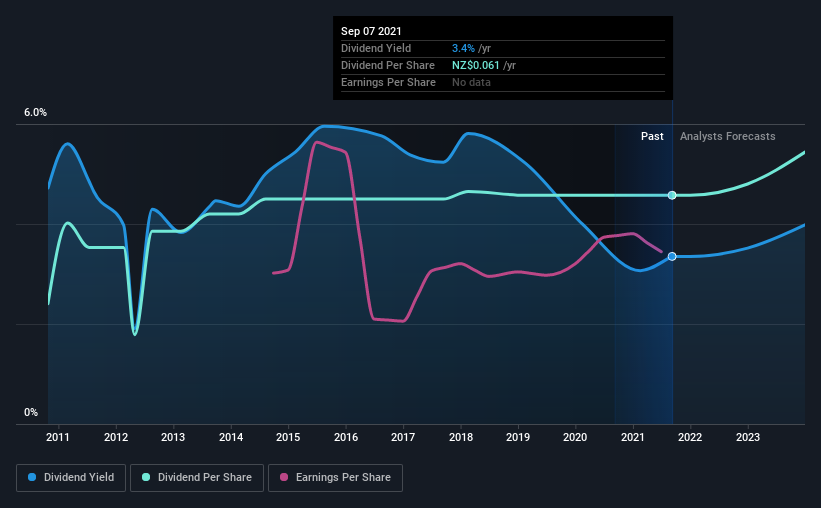We Wouldn't Be Too Quick To Buy NZX Limited (NZSE:NZX) Before It Goes Ex-Dividend
Some investors rely on dividends for growing their wealth, and if you're one of those dividend sleuths, you might be intrigued to know that NZX Limited (NZSE:NZX) is about to go ex-dividend in just 2 days. The ex-dividend date is one business day before the record date, which is the cut-off date for shareholders to be present on the company's books to be eligible for a dividend payment. It is important to be aware of the ex-dividend date because any trade on the stock needs to have been settled on or before the record date. Therefore, if you purchase NZX's shares on or after the 9th of September, you won't be eligible to receive the dividend, when it is paid on the 24th of September.
The company's next dividend payment will be NZ$0.035 per share. Last year, in total, the company distributed NZ$0.061 to shareholders. Based on the last year's worth of payments, NZX has a trailing yield of 3.4% on the current stock price of NZ$1.82. We love seeing companies pay a dividend, but it's also important to be sure that laying the golden eggs isn't going to kill our golden goose! So we need to investigate whether NZX can afford its dividend, and if the dividend could grow.
View our latest analysis for NZX
If a company pays out more in dividends than it earned, then the dividend might become unsustainable - hardly an ideal situation. Last year, NZX paid out 106% of its income as dividends, which is above a level that we're comfortable with, especially if the company needs to reinvest in its business.
When the dividend payout ratio is high, as it is in this case, the dividend is usually at greater risk of being cut in the future.
Click here to see the company's payout ratio, plus analyst estimates of its future dividends.
Have Earnings And Dividends Been Growing?
Companies with falling earnings are riskier for dividend shareholders. Investors love dividends, so if earnings fall and the dividend is reduced, expect a stock to be sold off heavily at the same time. NZX's earnings per share have fallen at approximately 8.7% a year over the previous five years. Such a sharp decline casts doubt on the future sustainability of the dividend.
Many investors will assess a company's dividend performance by evaluating how much the dividend payments have changed over time. NZX has delivered 6.6% dividend growth per year on average over the past 10 years. That's intriguing, but the combination of growing dividends despite declining earnings can typically only be achieved by paying out a larger percentage of profits. NZX is already paying out 106% of its profits, and with shrinking earnings we think it's unlikely that this dividend will grow quickly in the future.
The Bottom Line
Is NZX an attractive dividend stock, or better left on the shelf? Not only are earnings per share shrinking, but NZX is paying out a disconcertingly high percentage of its profit as dividends. Generally we think dividend investors should avoid businesses in this situation, as high payout ratios and declining earnings can lead to the dividend being cut. All things considered, we're not optimistic about its dividend prospects, and would be inclined to leave it on the shelf for now.
With that in mind though, if the poor dividend characteristics of NZX don't faze you, it's worth being mindful of the risks involved with this business. For example, we've found 2 warning signs for NZX (1 can't be ignored!) that deserve your attention before investing in the shares.
We wouldn't recommend just buying the first dividend stock you see, though. Here's a list of interesting dividend stocks with a greater than 2% yield and an upcoming dividend.
This article by Simply Wall St is general in nature. We provide commentary based on historical data and analyst forecasts only using an unbiased methodology and our articles are not intended to be financial advice. It does not constitute a recommendation to buy or sell any stock, and does not take account of your objectives, or your financial situation. We aim to bring you long-term focused analysis driven by fundamental data. Note that our analysis may not factor in the latest price-sensitive company announcements or qualitative material. Simply Wall St has no position in any stocks mentioned.
Have feedback on this article? Concerned about the content? Get in touch with us directly. Alternatively, email editorial-team (at) simplywallst.com.


